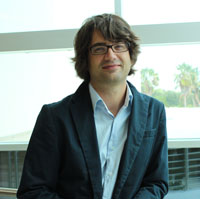Stephen Charbonneau

About
Stephen Charbonneau
PhD, University of California, Los Angeles, 2007
Email:
scharbo1@fau.edu
Phone:
(561) 297-3856
Areas of Expertise: Documentary Theory/History, Critical Theory, New Media Studies, Film Theory, Film History/Historiography
My work in film and media studies centers on questions of participation, intersubjectivity, collaboration, and everyday life within the context of documentary filmmaking as well as autoethnographic video and essayistic digital cultures. The spark for this direction came from an NYU undergraduate course with the late documentarian George Stoney, which featured a visit from a New York-based youth media organization, the Global Action Project. This organization deployed autobiographical and autoethnographic video production as a way for young people to cope with traumatic social and political issues through collaboration and inspired my article, "Global and Local Selves: (Dis)Placed Youth and Fraught Articulations of Home in the Global Action Project’s Peace of Mind" (Spectator 27.2). This led to a broader interest in the histories, theories, and practices of other NGOs whose work on autoethnographic film/video production had similar pedagogical goals. Additional articles on this front included, "Branching Out: Young Appalachian Selves, Auto-Ethnographic Aesthetics and the Founding of Appalshop," appearing in the Journal of Popular Film & Television; and “Claims to Be Heard: Young Self-Expressivity, Social Justice, and the Educational Video Center,” in Jump Cut.
The above work on the youth media organization, Appalshop, and its inception as a project of the War on Poverty (as a community film workshop) drew me further into a historical line of inquiry to consider understudied community-based and nontheatrical uses of the motion picture, ones that were tethered to postwar struggles for racial equality and deeply engaged with radical democratic principles. This path led, in 2012-13, to my receipt of a Fulbright Fellowship to pursue research on state-sponsored uses of documentary film to mediate and mitigate social conflict fueled by race and class. The result was my first book-length study, entitled Projecting Race: Postwar America, Civil Rights, and Documentary Film (Wallflower/Columbia University Press, 2016). Projecting Race presents a history of documentary filmmaking in the postwar era in light of race relations and the fight for Civil Rights. Drawing on extensive archival research and textual analyses, this book tracks the evolution of race-based, nontheatrical cinema from its neorealist roots (The Quiet One, Palmour Street, and All My Babies) to its incorporation of new documentary techniques intent on recording reality in real time (With No One to Help Us, Another Way, The Man in the Middle, The Farmersville Project, and The Hartford Project).
The archival research that contributed to Projecting Race is also animating my second book, a work-in-progress entitled Stoney: A Committed Life, A Committed Cinema. This book will review the life and work of George C. Stoney, whom the New York Times characterized as a "dean of American documentary." Stoney's remarkable life and work encompasses much of the twentieth century and represents an intersection of the history of North American social change with the history of cinema. The uniqueness of his story reflects his singular trajectory as a filmmaker whose work was often activist and collaborative, always contesting the boundaries of documentary conventions to feature voices and experiences that are typically rendered invisible in the American public sphere. This continuity to his life and work takes on distinct inflections across the decades, from the late thirties to the 2000s, and through his various filmic, programmatic, and activist endeavors.
Alongside these historical inquiries, I am continuing to explore the above themes within the context of contemporary media activist cultures and digital essayistic practices. This includes an anthology, co-edited with Chris Robé, on global media activism, entitled InsUrgent Media from the Front: A Global Media Activist Reader (under review), as well as another book project, The Twenty-First Century Essayistic. Informed by my courses on new media and digital documentary, this latter project is centered on the convergence of essayistic modes of expression and digital media. The historical legacy of the essayistic form, and its fusion of autobiographical expression with commentary on public experiences, has proven to be quite elastic as photographic and cinematic essays were common throughout the twentieth century. While there remains much to study about these past adaptations of the essay form, this project essentially looks at the pervasiveness of the essayistic as a frame for a whole range of digital media experiences.
Recent Publications
Projecting Race: Postwar America, Civil Rights, and Documentary Film. London/New York: Wallflower Press/Columbia University Press, 2016.
“The Man in the Middle,” Contribution to Columbia University Press Blog (https://www.cupblog.org/2016/08/17/the-man-in-the-middle/)
“Inside/Out: Navigating the Path from Scholarship to Visibility,” In Media Res (http://mediacommons.org/imr/2016/08/18/insideout-navigating-path-scholarship-visibility)
“Exporting Fogo: Participatory Filmmaking, War on Poverty, and the Politics of Visibility,” Framework 55.2, Fall 2014.
"John Grierson and the United States," The Grierson Effect: The Worldwide Influence of John Grierson on the Development and Deployment of Educational and Documentary Cinema. Edited by Deane Williams & Zoë Druick. London: BFI Press. Forthcoming, Fall 2014.
"Claims to Be Heard: Young Self-Expressivity, Social Justice, and the Educational Video Center," Jump Cut. Summer, 2011.
"Bonnie Klein, Saul Alinsky, and the American Dream," Challenge for Change / Société nouvelle: The Collection. Edited by Thomas Waugh, Michael Brendan Baker, & Ezra Winton. Queen’s McGill University Press, 2010.
"Branching Out: Young Appalachian Selves, Auto-Ethnographic Aesthetics and the Founding of Appalshop," Journal of Popular Film & Television 37.3, Fall 2009.
Recent Exhibitions and Performances
“Master Class with Luiz Fernando Goulart,” Hosted by the Latin American Training Center and Florida Atlantic University (Moderator) February 5th, 2018.
“Mediated Rights: The Transformative Power of Images from Selma to Ferguson,” Georgia State University, Atlanta GA (Co-Organizer, with Ellen Scott, Samantha Sheppard, and Jaimie Baron) March 31st, 2016
"15 Years Later, Global Activism in the Wake of Seattle: Remixing History" Northwest Film Forum, Seattle WA (Co-Organizer) March 19, 2014
"Public Media 2.0: A Conversation on the Future of Urban Documentary and Social Change with Allan Siegel, Steve James, and Gordon Quinn" Museum of Contemporary Art, Chicago IL (Co-Organizer) March 2013
